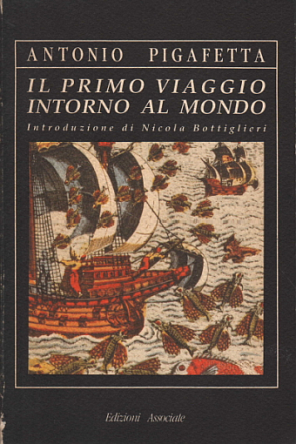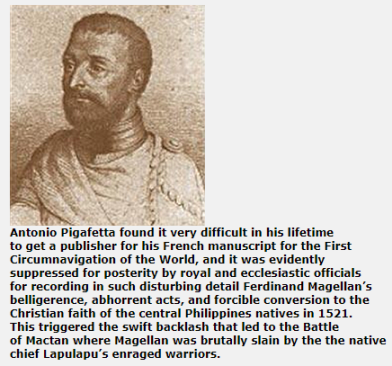In 1522, when Antonio Pigafetta got back from the Magellanic voyage, his manuscript for its official chronicles drew not even lukewarm comment nor sign of interest from the Roman Emperor and King Charles V to whom he personally presented it. What worsened matters was that his captain-general, about whom he had written the manuscript, had been killed in the Battle of Mactan and thus failed to accomplish his primary mission for the Spanish sovereign.
IMAGE CREDIT: PAINTING COURTESY OF CEBUWANDERLUST.COMCaptain-general Ferdinand Magellan about to meet a violent death
from antagonized tribal natives in the Battle of Mactan in 1521
To better understand Pigafetta’s predicament, recall that within 45 days after the chronicler’s return to Spain on September 8, Maximilianus Transylvanus, a royal courtier and secretary to the Roman Emperor Charles V, had already appropriated Pigafetta’s chronicles for his Latin tract
“De Moluccis Insulis” from Peter Martyr d’Anghiera’s abridgment in
“De orbe novo decades” (
Decades of the New World).
Extremely well-connected and ambitious, Transylvanus easily overtook Pigafetta in getting a book ready about the first circumnavigation of the globe. He had freely abridged Pigafetta’s account for his first-person tract
“De Moluccis Insulis” that year and presented it on October 23 as a letter to his powerful patron, the Cardinal-Archbishop of Salzburg, Matthäus Lang von Wellenburg. It was printed three months later and went on as a best seller for several decades.
“De Moluccis Insulis” carried this grandiloquent introduction by Transylvanus’ associate Giovanni Battista Ramusio: “The voyage made by the Spaniards round the world in the space of three years is one of the greatest and most marvellous things which have been heard of in our times… The voyage was described very minutely by Peter Martyr, who belonged to the Council of the Indies of His Majesty the Emperor, and to whom was entrusted the duty of writing this history; and by him were examined all those who remained alive of that expedition, and who reached Seville in the year 1522.”
In
“De Moluccis Insulis,” Transylvanus acknowledged
Massana (Mazaua) as the Magellan fleet’s anchorage but totally discarded Pigafetta’s chronicles of the first Holy Mass and of Magellan’s amity with the native chiefs and subjects that made the Mazauans willingly convert to the Christian faith. Transylvanus then quickly moved the action to
Zzubu (Cebu) where Magellan, flush with his success in converting Mazauans, soon became so pushy, intimidating, and belligerent in dealing with the
Zubbuth chiefs, making such a garish spectacle of forcibly converting the natives to the Christian faith to the point of antagonizing the natives.
Transylvanus abridged the Cebu episodes heavily, expunging many of Magellan’s abhorrent acts towards the natives as recorded by Pigafetta in the French manuscript that he had intended to publish in 1522-1523 but was suppressed for posterity.
Some of the expunged passages:
—On Magellan’s hostile posture approaching Cebu: “(T)he captain-general commanded all his ships to hang out their flags. Then we lowered the sails in the fashion in which they are struck when going to fight, and he had all the artillery fired, at which the people of this place were greatly frightened... But the interpreter reassured them, saying that it was the fashion and custom to fire artillery when they arrived at ports, to show signs of peace and friendship; and also, to do more honour to the king of the country, they had fired all the artillery.”
— On Magellan’s refusal to pay a tribute (tax) for his ships: “The [native] king answered him that he was welcome, but that the custom was that all ships which arrived at his country or port paid tribute...The interpreter said to him that this captain, on account of being captain of so great a king as his was, would not pay tribute to any sovereign in the world; and that if he wished for peace he would have peace, and if he wished for war he would have war.”
More expunged passages next issue.
Read on Google Drive pages 17-36--the Magellanic Fleet’s 1521 sojourn in the Philippine archipelago--in Pigafetta’s recovered “The First Voyage Round the World” chronicles as translated into English by Lord Stanley of Alderley (https://tinyurl.com/hjrherbp) (Next:
Getting our history right after 500 years – Part 12) June 17, 2021
This essay, 2,049th of the series, appeared in the column “English Plain and Simple” by Jose A. Carillo in the Campus Press section of the June 10, 2021 Internet edition of The Manila Times,
© 2021 by the Manila Times Publishing Corp. All rights reserved. Read this article online in
The Manila Times:
“Getting our Philippine history right after 500 years - 11”To listen to the audio version of this article, click the encircled double triangle logo in its online posting in
The Manila Times.
PICTOGRAPHIC:TWO DIFFERING VERSIONS OF PIGAFETTA’S CHRONICLES OF THE MAGELLANIC SOJOURN IN THE PHILIPPINE ARCHIPELAGO IN 1521
